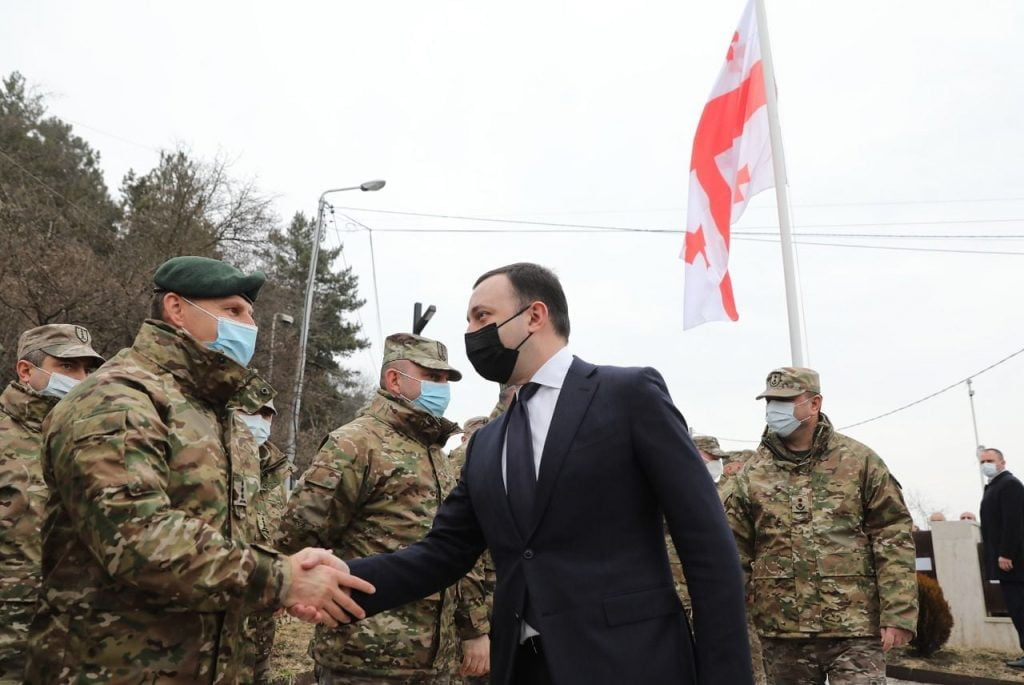Marking the Day of Soviet Occupation in 1921, PM Irakli Garibashvili seized the opportunity today to criticize the former UNM administration and ex-President Mikheil Saakashvili over handling events leading up to Russo-Georgian War of August 2008.
In his remarks, coming amid opposition’s strong criticism against the Georgian Dream government’s reserved stance over Russia’s war against Ukraine, Garibashvili claimed the United National Movement now aims to “create provocations and repeat the calamity they could not avert with the August 2008 War.”
The Prime Minister cited recent CNN interview with Condoleeza Rice, ex-Secretary of State “she once again recalled the events of August [2008], saying they were aware of Russia’s plan to invade Georgia, that means they informed informed the Georgian authorities about it.”
“Failing to calculate the most basic thing and falling to provocation in a silly, ignorant, anti-state manner after this [information], of course, represents treason,” the Prime Minister asserted.
“Even former U.S. Ambassador,officials, State Department’s Dan Fried, former Ambassador [Richard Monroe] Miles were saying that the August War was not inevitable. This is my assessment.”
Justifying his government’s “pragmatic” stance during full-scale Russian invasion against Ukraine, the Prime Minister said, “In Georgia, time is up for anti-state, anti-national, and uncalculated policy.”
The UNM and other opposition parties have frequently criticized the controversial August War remarks by the Georgian Dream government members.
Responding one of such criticisms back in 2019, ex-President Saakashvili retorted that the Georgian Dram government was “a continuation of Putin’s war against Georgian people.”
Remarks by Condoleeza Rice, top U.S. diplomat during Russo-Georgian War of August 2008, with CNN’s Fareed Zakaria:
We tried to head it off starting all the way back in 2007, because we knew that Abkhazia and [South] Ossetia were powder kegs. Whoever decided to put Russian peacekeepers in Abkhazia and [South] Ossetia as a part of an OSCE peacekeeping force made a terrible mistake that was not our decision. I tried with Frank-Walter Steinmeier, who at the time was the German Foreign Minister, to have some kind of agreement to bring down temperature.
I remember saying to Saakashvili, the Russians are gonna try to provoke you, don’t let them. And in fact, the Russians provoked them and then the war broke out. When that happens, the United States in a difficult position. We are not in a position to go to war with Russia over Georgia. And so, what we tried to do was to strengthen Georgian forces. They had some forces for instance in Iraq, we brought them back. We actually used some naval exercise in a and around the Black Sea to demonstrate support to Georgians.
After the invasion had taken place, we believe that the Russians might have even thought about Tbilisi. Sergey Lavrov, the Russian Foreign Minister, called me and he said there are three conditions for the end of the war. One is the Georgians go back to the barracks. Fine, done. The second is that they have to take a no use of force pledge. Fine, done, no problem. And then, he said, it is just between us, Misha Saakashvili has to go. And I said, Sergey, the Russian Foreign Minister and the American Secretary of State don’t have a conversation about overthrowing a democratically elected government. And I’m going to tell everybody that that’s one of your conditions, and I did. He was never the same with me. But I think the fact that they wanted to overthrow the Georgian government and that we exposed it, was very important in seeing a limitation to what they were willing to do.
After the fact, we were able to, with French help, negotiate a place that they were well out of the major Georgian cities, get a billion dollars to support Georgians, and to begin to try to put sanctions on them. But frankly, the Europeans weren’t there. And when the Obama administration came to office within a few years, he few sanctions that ere there began to erode as a part of reset. By the way, I don’t blame anybody, the reset was possibly a good try, given that Medvedev had come to replace Putin temporarily. But I think we did all that we could do. I don’t know that without European support there was much more we could do.
And after all, Georgia survived.
More on the topic:

